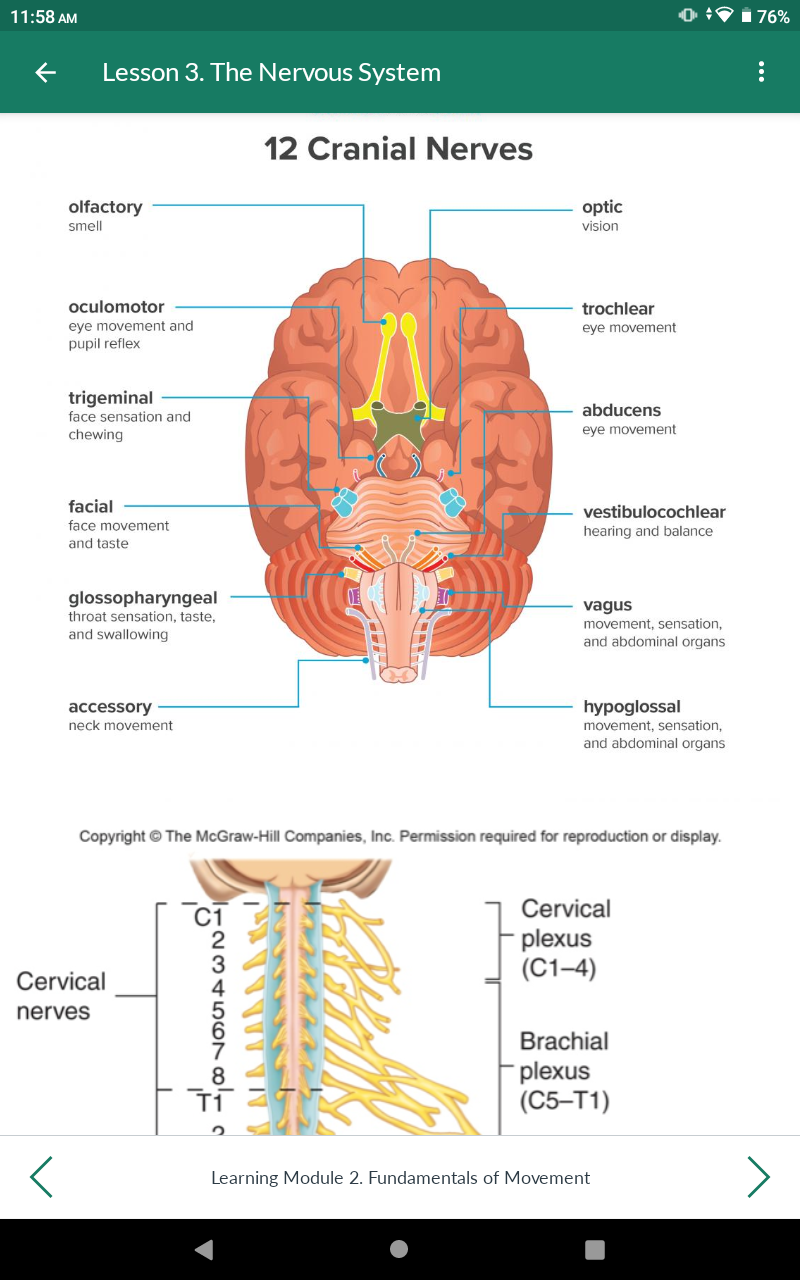What are the 12 cranial nerves and their functions?

Understand the Problem
The question seeks to identify the twelve cranial nerves along with their functions as presented in the image.
Answer
Here are the 12 cranial nerves and their primary functions: 1. Olfactory - smell 2. Optic - vision 3. Oculomotor - eye movement 4. Trochlear - eye movement 5. Trigeminal - face sensation and chewing 6. Abducens - eye movement 7. Facial - face movement and taste 8. Vestibulocochlear - hearing and balance 9. Glossopharyngeal - throat sensation, taste, and swallowing 10. Vagus - movement, sensation, and abdominal organs 11. Accessory - neck movement 12. Hypoglossal - movement, sensation, and abdominal organs
Here are the 12 cranial nerves and their functions according to the image provided:
- Olfactory nerve (I) - smell
- Optic nerve (II) - vision
- Oculomotor nerve (III) - eye movement and pupil reflex
- Trochlear nerve (IV) - eye movement
- Trigeminal nerve (V) - face sensation and chewing
- Abducens nerve (VI) - eye movement
- Facial nerve (VII) - face movement and taste
- Vestibulocochlear nerve (VIII) - hearing and balance
- Glossopharyngeal nerve (IX) - throat sensation, taste, and swallowing
- Vagus nerve (X) - movement, sensation, and abdominal organs
- Accessory nerve (XI) - neck movement
- Hypoglossal nerve (XII) - movement, sensation, and abdominal organs
Answer for screen readers
Here are the 12 cranial nerves and their functions according to the image provided:
- Olfactory nerve (I) - smell
- Optic nerve (II) - vision
- Oculomotor nerve (III) - eye movement and pupil reflex
- Trochlear nerve (IV) - eye movement
- Trigeminal nerve (V) - face sensation and chewing
- Abducens nerve (VI) - eye movement
- Facial nerve (VII) - face movement and taste
- Vestibulocochlear nerve (VIII) - hearing and balance
- Glossopharyngeal nerve (IX) - throat sensation, taste, and swallowing
- Vagus nerve (X) - movement, sensation, and abdominal organs
- Accessory nerve (XI) - neck movement
- Hypoglossal nerve (XII) - movement, sensation, and abdominal organs
More Information
The cranial nerves are integral in transmitting information between the brain and various parts of the body, affecting functions such as smell, vision, movement, and balance.
Tips
A common mistake when learning the cranial nerves is confusing their order and functions. Using mnemonic devices can help memorize the sequence and respective functions.
Sources
- Cranial Nerves List And Their Functions - BYJU'S - byjus.com
- What Are The 12 Cranial Nerves and Their Function? - MedicineNet - medicinenet.com
AI-generated content may contain errors. Please verify critical information